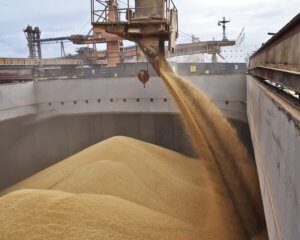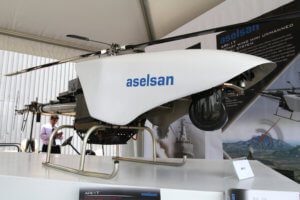
Ukraine since the beginning of the 2018/2019 marketing year (MY, July-June) and as of October 10 had exported 10.173 million tonnes of grain, which is 9% less than on the same date of the previous MY.
According to the Ministry of Agrarian Policy and Food, the country exported about 6.03 million tonnes of wheat, 2.23 million tonnes of barley, and 1.73 million tonnes of corn.
In addition, 52,800 tonnes of flour had been exported on the date.
As reported, with reference to the ministry, Ukraine exported 39.4 million tonnes of grain in the 2017/2018 MY. Export of grain in the 2018/2019 MY is projected to be 42 million tonnes.

The Zaporizhia international airport in September 2018 saw a 13% fall in passenger flow year-over-year, to 36,000 people.
Director of the airport Viktor Biskupsky told Interfax-Ukraine that along with the seasonal decrease in activity, the reason for the decline in passenger traffic was the annulment of regular flights in Ukraine by Atlasjet Ukraine, the annulment of flights to Batumi and Tel-Aviv by Ukraine International Airlines (UIA), and the switch to lower capacity planes by airlines on domestic flights (in particular, by UIA).
At the same time, he said that all domestic flights from Zaporizhia are fully filled.
According to the information on the website of the Zaporizhia International Airport, on domestic flights the decline in passenger traffic was 23% (7,300 people), on international flights – 10.4% (2,400 people).
In general, in January-September-2018, the passenger traffic at the Zaporizhia airport amounted to 297,500 people, almost 19% more than last year. On domestic flights, growth was 12.7% – to almost 71,000, on international flights – by 20.9%, to 226,600.
The number of aircraft departures, according to the airport, amounted to 2,434 and increased by 16.5% over the same period last year.

The Dutch Development Bank FMO and Diligent Capital Partners (DCP) jointly acquired 16% in Allseeds S.A. (Luxembourg), the holding company of a large Ukrainian vegetable oil producer and exporter – Allseeds Group.
“We needed to attract additional investments. FMO responded to the proposal and during the year we implemented the deal,” Allseeds Group CEO Viacheslav Petryshche said at a press conference in Yuzhne (Odesa region).
The deal was closed on September 19.
According to a press release from Allseeds, FMO and DCP jointly acquired shares, providing funding for the implementation of the Allseeds development strategy, which includes expanding the capacity for processing oilseeds, transshipment for the export of oils and meal and increasing added value.
As reported, the Antimonopoly Committee of Ukraine allowed the Dutch Development Bank FMO to indirectly enter the capital of Allseeds.
Allseeds Group was founded in 2010. In July 2015, the group commissioned an oil extraction plant at Yuzhny port with a capacity of processing 2,400 tonnes of sunflower seeds per day (or 1,800 tonnes of rapeseeds, or 1,500 tonnes of soybeans).

State-owned enterprise Spetstechnoexport and Turkey’s defense company Aselsan have signed a memorandum confirming plans to start production of Turkish tactical communications devices in Ukraine. An Interfax-Ukraine correspondent has reported that the sides signed the document at the 15th international specialized exhibition Arms and Security 2018 opened in Kyiv on October 9.
Spetstechnoexport Head Vladyslav Belbas told Interfax-Ukraine that the signed document confirms mutual commitments of the parties outlined in the offset agreement signed by Spetstechnoexport and Aselsan in July in Ankara after a meeting of the bilateral intergovernmental commission for defense cooperation. The details of the project are being approved.
As reported, in October 2017, Aselsan and Spetstechnoexport signed a government-guaranteed contract in Kyiv for the amount of $43.635 million for delivery of tactical communications to be used in the USB band in the interests of the Armed Forces of Ukraine in 2018 as part of the government defense procurement order. According to Ukrainian legislation, purchases of defense imports under the government defense procurement order amounting to more than $5 million provide for the conclusion of an offset agreement.
ASELSAN, COMMUNICATIONS DEVICES, PRODUCTION, TACTICAL, TURKEY